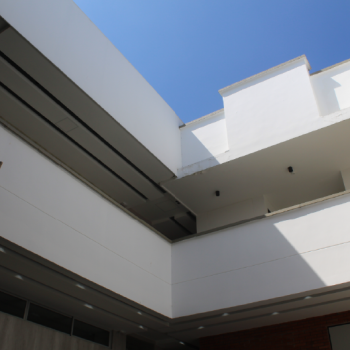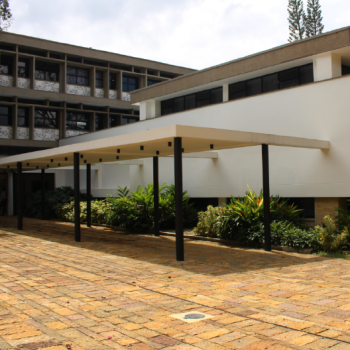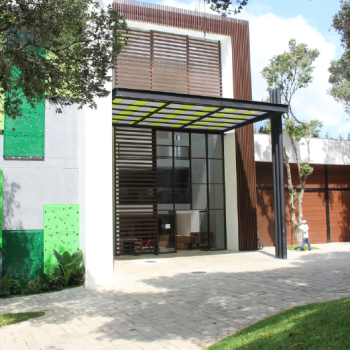Office of the Vice President for Academic Affairs
INNOVA-TIC 2025 Call
Introduction to the
Call
The INNOVA-TIC Call aligns with the institutional policy supporting education through Information and Communication Technologies (ICT) (Superior Agreement No. 051 of 2009), which establishes guiding principles for the appropriate adoption and use of technologies as enablers to enrich teaching and learning processes at the Universidad Industrial de Santander (UIS). In this context, the call acknowledges the importance of technological tools and strategies to strengthen teaching and learning processes mediated by ICT.
In line with the current context, the INNOVA-TIC 2025 Call aims not only to support teaching initiatives but also to adapt educational processes to emerging technological trends. Artificial intelligence, machine learning, virtual reality, and other technological innovations are key elements that can be effectively integrated into training proposals through ICT.
In this sense, pedagogical innovation becomes crucial in a constantly evolving educational environment, where ICT plays a fundamental role. Thus, digital inclusion becomes a core pillar, ensuring that all pedagogical activities consider the diversity of contexts and needs in the educational sphere. Therefore, the call seeks not only to encourage the adoption of technologies but also to ensure that they contribute to equity and accessibility in education.
The Academic Vice-Rector’s Office and the ICT Leadership Team (ELTIC) at the Universidad Industrial de Santander recognize the effort, dedication, and creativity of professors who invest time in developing strategies for incorporating ICT into sequences, actions, and teaching resources. They invite UIS professors to actively participate by proposing innovative didactic strategies within this call that foster the creation of more flexible learning environments, adapted to the demands of contemporary education. Proposals may include, but are not limited to:
Read More
- Development of Digital Resources: creation of wikis, instructional videos, digital books, and audiovisual materials to support student learning.
- Online Courses, Workshops, or Classes: design and execution of online courses, workshops, or classes that leverage the advantages of virtual education.
- Flipped Classroom and Blended Learning Strategies: implementation of innovative approaches such as flipped teaching or blended learning, using ICT to enhance the educational experience.
- Technological Tools for Extending the Classroom to Remote Settings: development of applications, virtual labs, and simulators that allow learning experiences to extend beyond the physical classroom.
- Use of Educational Tools Licensed by the UIS Library: integration of educational tools licensed by the UIS Library, utilizing the resources available in this department’s service portfolio.
- Incorporation of Specialized Software Tools: integration of specialized software into the teaching and learning process, tailored to the needs and demands of each discipline.
- International Collaborative Learning Activities Mediated by Technological Platforms: participation in international collaborative learning initiatives (COIL and others), using technological platforms to foster interaction between students from different regions of the world.
- Incorporation of Artificial Intelligence Tools to Support Learning Strategies.
- Design and Development of Custom “Generative Pre-trained Transformers (GPT)” Models or Personalized Intelligent Assistants: projects should design GPT models that enrich academic content, adapting to the specific needs of each academic activity and significantly contributing to the educational process. These models should cover at least 20% of the content of the academic activity, stating the competencies that will be assisted by the GPT, which will be promoted as support for independent work.
- Development of Interactive Simulations Based on ICT to Enhance Active Learning and Improve Understanding of Complex Concepts in the Classroom.
Important
Dates
15
Thursday
May
Deadline for submitting proposals.
14
Friday
November
Closing of execution and implementation of winning proposals.
28
Friday
November
Completion and submission of documents for closure.
DOCUMENTATION AND
Regulations
Objective of the
Call
Encouraging the development and implementation of innovative didactic initiatives through ICT tools in the UIS undergraduate education to address the challenges of the new era, promoting digital literacy, problem-solving, and creativity. This is done with a focus on the individualization of learning, fostering global collaboration, digital competencies, and a culture of continuous innovation.
This call actively values and promotes interdisciplinary collaboration. Proposals that involve multiple schools, merging perspectives and knowledge from different disciplines to develop innovative and versatile models are encouraged. Proposals that demonstrate effective and creative integration of multiple academic fields will receive special consideration and higher scores in their evaluation. This interdisciplinary collaboration will not only enrich the projects but also foster a more integrated and cooperative academic environment at our university.
Incentives of the
Call
The incentive for each proposal will be the funding of the approved items in the budget component, with a maximum limit of $12,361,200, which includes three possible items:
Student assistants
Professional fees
Computer equipment
Additionally, full-time professors will receive a total of two (2) PADs for the execution of the proposal during a single academic semester. The recognition in PAD does not imply a reduction in the director’s academic activities; that is, this recognition does not exempt the professor from fulfilling the minimum requirements set by institutional regulations for the direction of academic activities.
Requirements of the
Call
- The author and co-authors must be UIS professors* and must be in good standing with other TIC Calls developed by the Academic Vice-Rector’s Office.
- The proposal must focus on improving the teaching and learning processes of UIS undergraduate students.
- The proposal must follow the presentation instructions outlined in Annexes 1 and 2.
- At least one (1) of the professor authors and co-authors presenting the proposal must certify that they have completed the course “UIS21 Pedagogical Model – Recognizing Ourselves,” offered by CEDEDUIS**.
*Includes full-time career professors, adjunct professors, tutors, occasional professors from regional campuses, special and temporary professors, and adjunct professors from the general cycle.
*This is a formative experience designed to generate an institutional reflection process regarding the transformation that the UIS21 Pedagogical Model brings to the approach to teaching. It is a virtual, self-directed modality with a duration of 20 hours. For more information, you can contact ceded@uis.edu.co.
Application Form
Stages of the
Call
- Schedule
- 1. Preparation and Submission of the Proposal
- 2. Requirement Verification
- 3. Evaluation of Proposals
- 4.Proposal Selection
- 5. Closure of the Proposal
Schedule of the Call
.
| Stage | Dates |
| Deadline for the preparation and submission of proposals to the Academic Vice-Rector’s Office via the form | May 15, 2025. |
| Preliminary Publication of Requirement Verification | 5 business days after the form submission deadline. |
| Deadline for rectification of requirements | 3 business days after the request for rectification is made. |
| Final Publication of Requirement Verification | 2 business days after the rectification deadline. |
| Closure of Evaluation and Selection of Winning Proposals | 10 business days after the final publication of requirement verification. |
| Publication of Final Results of Winning Proposals | 2 business days after the closure of evaluation and selection |
| Closure of Execution and Implementation of Winning Proposals | November 14, 2025. |
| Completion and Submission of Documents for Closure | November 28, 2025. |
Preparation and Submission of the Proposal
The INNOVA-TIC 2025 call begins with the submission of proposals, through which professors will explicitly outline the competencies they aim to develop in students.
The proposals will consist of a technical component and a budgetary component, as described in Annexes 1 and 2, respectively.
Obtaining Proposal Approval
The authors of the proposal must obtain the approval of the School Director or Program Coordinator (in the case of IPRED). The approval must be completed for each author using the format provided in Annex 3.
Submission of Proposals
Finally, the professor will submit the proposal to the Academic Vice-Rector’s Office via the form, as outlined in Annexes 1, 2, and 3. The professor must ensure that the aforementioned annexes are completed prior to submission.
Verification of Requirements
The proposals submitted within the deadline will be reviewed for compliance with the requirements and the budgetary component by an evaluation panel formed by members of the ELTIC. This verification will take place before the rectification period and aims to identify any budgetary issues that might affect the execution of the proposal, considering the capacities and institutional resources available for this call.
At the end of this review, the preliminary results of the requirement verification will be published, specifying which proposals meet the requirements, which need adjustments, and which are excluded. The adjusted proposal must be sent to the Academic Vice-Rector’s Office before the end of the rectification period, following the instructions provided.
Once the final verification of requirements is completed, the definitive results of this period will be published.
Evaluation of Proposals
The evaluation panel will assign a score to each proposal based on the criteria outlined in the following table. Each criterion will be evaluated on a scale from 0 to 3. The results of the selection process and the corresponding scores will be published on the dates established in the call’s timeline.
Criteria | Weighting |
Potential Impact | 35% |
Pedagogical Quality | 35% |
Technological Innovation | 20% |
Relationship with the UIS21 Pedagogical Model | 10% |
Impact Potential (35%): evaluates the coverage of the beneficiary population, the reusability of the resource, alignment with emerging technological trends, long-term sustainability, and impact on educational equity and digital inclusion.
Pedagogical Quality (35%): refers to the pedagogical foundation of the proposal, consistency with active and collaborative learning approaches, adaptability to different learning styles, and the integration of innovative methodologies.
Technological Innovation (20%): seeks to assess the level of technological innovation in the proposal, the integration of emerging tools such as artificial intelligence, augmented reality, blockchain, and creativity in the design of technology-mediated learning experiences.
Relation to the UIS21 Pedagogical Model (10%): Relationship of the Proposal with Each Aspect of the UIS21 Pedagogical Model MPUIS21:
- Student-Centered Learning and the Learner
- Focused on Innovation Training
- Supported by the Use of Information and Communication Technologies (ICT)
- Materialized in the Imprint of Common Graduate Traits
- Deployed at the Macro, Meso, or Micro-Curricular Levels
- The criteria are the same as those presented in Annex 4.
Additional Points to Proposal Evaluation
Teams that fully or partially meet the following specifications will earn additional points in the evaluation, as outlined below:
Development of Generic Competencies: proposals that promote the development of generic competencies such as teamwork, effective communication, leadership, problem-solving, and creativity, in the context of students’ professional training, will receive up to 0.4 additional points to the weighted score.
Focus on Inclusive Education: proposals that highlight inclusive and accessible strategies for different populations, such as adaptations for individuals with disabilities, multilingual content, or specific support tools, will receive up to 0.3 additional points to the weighted score. Commitment to diversity and educational equity will be valued, considering what is established in the Agreement No. 032 of 2019
Focus on Plurilingualism and Multiculturalism:
proposals that implement strategies for the internationalization of the curriculum, the development of global or multicultural competencies, will receive up to 0.3 additional points to the weighted score.Promoting the Work of Teaching Collectives:
proposals that include two or more professors in any form of involvement, as proposers, will receive up to 0.2 additional points to the weighted score.
Selection of Proposals
To be considered eligible, a proposal must obtain at least 80% of the maximum possible score.
The top three (3) proposals with the highest scores from the eligible list will be declared the winners.
The authors of the selected winning proposals will be contacted by the Academic Vice-Rector’s Office for the signing of the initiation document for the proposal development.
Note: In the case of a tie, the tie will be broken by comparing the scores obtained in the individual indicators, ranked according to the weighting of the evaluation criteria (See Table 1). If the tie persists, the final winner will be selected randomly using an automated tool.
Closure of the Proposal
.
The closure of execution will take place once the compliance with the commitments and the requirements for the final products outlined in the proposal and the initiation document are verified.
In addition to submitting the final products, the applicant must:
Incorporate Innovation in the Relevant Virtual Classroom:
ensure that the proposed innovations are effectively integrated into the respective Virtual Classroom.Submit the Final Report on Execution and Implementation:
the final execution and implementation report must be submitted according to the established format.Submit the Final Product Delivery and Dissemination Letter:
the applicant must submit the official letter confirming the delivery of the final products and the dissemination of the results.Submit the Certificate of Participation in the Course:
the certificate of participation in the course “University Policies: UIS21 Pedagogical Model – Recognizing Ourselves,” offered by CEDEDUIS, must be provided for each professor-author of the proposal.Disseminate the Results within the Academic Unit:
the applicant must present the execution and implementation results within the respective academic unit. This should include an official record from the faculty council, program council, or school council, as appropriate. At least two members of the ELTIC must be invited to participate in this activity.Present the Results in an ELTIC-Organized Event:
the results of the proposal must be presented at an event organized by ELTIC.Affiliation to the Universidad Industrial de Santander:
the authors must explicitly include their affiliation with the Universidad Industrial de Santander in all final products.Verification of Products and Commitments:
the verification of all products and commitments will be completed within a maximum period of two months following the scheduled completion date.
It is important to remind participants that, as the Universidad Industrial de Santander is a public institution subject to oversight by state control bodies, failure to comply with the commitments made within the scope of this call may result in appropriate sanctions according to the type of affiliation with the University.
Formative experience aimed at generating an institutional reflection process regarding the transformation that the UIS21 Pedagogical Model brings to the approach to teaching. It is a virtual, self-directed modality with a duration of 20 hours. For more information, you can contact ceded@uis.edu.co.
For professionals, professors, and students participating in the collective that implements the proposal, this requirement is optional.
Intellectual
Property
By participating in the call, the applying professors acknowledge and accept that, when producing content to be disseminated through digital media, they do not infringe upon the intellectual property rights of third parties. If necessary, they will provide the required authorizations and/or assignments of the proprietary rights of the developments or products obtained in favor of the University.
In any case, the applying professors commit to holding UIS harmless from any claims by third parties related to the ownership of copyright on the products derived from this call.
Without prejudice to the moral rights, which will always be acknowledged to the authors, the ownership of the proprietary rights derived from the creations subject to this call will belong to UIS, in accordance with the laws on intellectual property and Articles 11 and 12 of Agreement No. 093 of 2010 – Intellectual Property Regulation.
Therefore, since UIS holds the proprietary rights to the products derived from this call, it reserves the right to use, reproduce, adapt, publicly communicate, arrange, or transform the obtained products in any other way, as well as all the rights provided by the legal framework.
Additional
Information
For additional information about this call, you can contact the TIC liaison professor – PETIC from your faculty, as listed in the following table:
| Faculty | Name of ICT – PETIC Liaison Professor | |
| IPRED | Margarita RODRÍGUEZ VILLABONA | marodvil@uis.edu.co |
| Science | Claudia Inés GRANADOS PINZÓN | cigranad@uis.edu.co |
| Human Sciences | Ana María LOAIZA GIRALDO | aloaiza@uis.edu.co |
| Physicochemical Engineering | Giovanni MORALES MEDINA | gmorales@uis.edu.co |
| Mechanical and Physical Engineering | Jorge Enrique MENESES FLOREZ | jmeneses@uis.edu.co |
| Health | Claudia Cristina ORTÍZ LÓPEZ | ortizc@uis.edu.co |
| CEDEDUIS | Hernando GUERRERO AMAYA | director.cededuis@uis.edu.co |
| Nombre profesor enlace de TIC – PETIC |
| IPRED Margarita RODRÍGUEZ VILLABONA marodvil@uis.edu.co |
| Ciencias Claudia Inés GRANADOS PINZÓN cigranad@uis.edu.co |
| Ciencias Humanas Ana María LOAIZA GIRALDO aloaiza@uis.edu.co |
| Ing. Fisicoquímicas Giovanni MORALES MEDINA gmorales@uis.edu.co |
| Ing. Fisicomecánicas Jorge Enrique MENESES FLOREZ jmeneses@uis.edu.co |
| Salud Claudia Cristina ORTÍZ LÓPEZ ortizc@uis.edu.co |
| CEDEDUIS Hernando GUERRERO AMAYA director.cededuis@uis.edu.co |
You can also contact María del Pilar Díaz Jaimes for any questions or concerns regarding the call at the email: politica.tic@uis.edu.co. If you require support with the Moodle platform, please reach out to Engineer Jorge Iván Torres Camacho at the email: jitorres@uis.edu.co.



General
Results
-
Final results of the evaluation and selection of winning proposals
PDF document. Published on Jun 17, 2025
Would you like more information?
Contact Us


jitorres@uis.edu.co
María del Pilar Díaz Jaimespolitica.tic@uis.edu.co


UIS Central Campus
Bucaramanga, Santander
Carrera 27 calle 9


Office Hours
From Monday to Friday
7:00 a.m. – noon
2:00 p.m. – 5:00 p.m.
